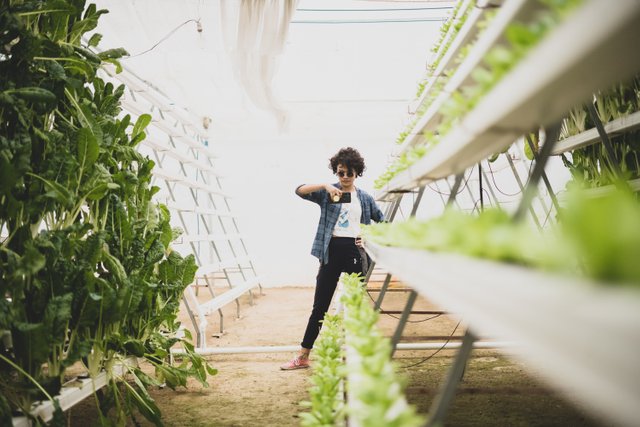Hydroponic Pros & Cons Every Gardener Should Know

With the rise in the cost of living and disruptions to food chain supplies, buying fresh fruit and vegetables has become too expensive for most. Because of this, there has been a surge in local crop production and home vegetable gardens. On top of that, people have become more mindful of food safety and want fresh food that has been produced with sustainable methods and is free from pesticides.
Hydroponics can address all these issues by facilitating the production of organic crops in a relatively small space without the need for soil cultivation and additions of traditional farming resources like pesticides and machinery.
Hydroponic farming - the pros
Hydroponics is the method of growing food using water-based nutrients instead of soil. Nearly any crop can be grown year-round when using hydroponics. The process is quite simple and low maintenance, with many advantages including
1. Saves water
Plants grown in a hydroponic setup barely use 10% of water compared to traditional food-from-soil farming. This is because the water used in a hydroponic system is reused/recirculated. Therefore, the only type of water loss comes from natural evaporation or from system leaks (which are avoided with regular maintenance).
2. Healthier growth and yield
Hydroponics provides a controlled environment for crops, making conditions ideal for bountiful growth and quality. Additionally, directly supplying the roots with the required nutrient-rich water solution helps them to grow faster. Since hydroponics generate a higher yield of crops in a much smaller space, transportation costs of food are reduced substantially and more people have access to fresh, high-quality food.
3. Almost anything can be grown
You can grow just about anything hydroponically as you would from the soil. From leafy greens to root vegetables such as carrots and even lawn grass! In fact, home growers with pets can use hydroponic-grown grass as potty grass for dogs! Simply grow grass from seed, fill a plastic container with soil and lay some of your grass sod on top, give it a chance to root into the soil, then just swap them every now and then – water the one your dog isn't using, and mow your instant turf when needed!
4. Fewer pesticides
Because hydroponic systems are indoors, pests aren’t as prevalent as outdoor growing. You also have controlled entrances, further reducing the chance of pests and rodents entering your crop. Of course, fewer pest problems mean little to no need for pesticides – ensuring your food is free from toxins.
5. Less resources
Another advantage of hydroponics is that it reduces the need for costly resources. Unlike soil farming, you don’t need heavy machinery or equipment, you don’t need costly fertilisers and you use less water. More energy is saved when crops require no intensive plowing, seeding, weeding, fertilization, and cultivation. This means hydroponics reduces carbon footprint.
Hydroponic farming - the cons
Depsite its advantages, hydroponics has been met with some criticism. Primarily, a lack of transparency from commercial hydroponic growers. Some farms claim to be organic but aren’t. Here are some disadvantages of hydroponics:
1. Time-consuming
Hydroponics is slightly time-consuming. Since the plants are growing and thriving entirely on water, you need to regularly monitor them to see if they are doing fine. You also need to replace the water at regular intervals and monitor pH levels to ensure plants are growing in optimal conditions. To maintain a carefully controlled growing environment, lights, and temperature controls will also need to be routinely monitored.
2. Organic debate
There is an ongoing debate in the farming community about whether hydroponic produce can be labeled organic according to USDA standards. However, the U.S. Federal Court has since ruled in favour of USDA allowing hydroponically produced plants to be certified organic, provided they are free from chemical fertilisers, GMOs, and sewage.
3. Vulnerable to power outages
Hydroponics systems rely on electricity to power different components including grow lights, water pumps, fans and aerators. If there were to be a power outage or electrical fault, plants can quickly perish without timely intervention.
4. Expensive
The initial costs of hydroponics can be expensive. You will need to invest in high-quality equipment to be successful along with the relevant infrastructure and supplies. However, home hydroponic setups can be far cheaper than commercial setups.
5. Risk of waterborne diseases
While a hydroponic setup gets rid of the risk of soil-borne diseases, there is a slight risk of waterborne diseases due to the continuous circulation of water. Uncontrolled humidity levels can also increase the risk of spore germination on plants. This can potentially destroy all plants in the system, sometimes within just hours.
Should you try a hydroponic garden at home?
Hydroponics is a great way to grow and produce healthy fruits, vegetables, and plants at home without the need for soil. Hydroponics requires less space than plants grown in soil, and you can grow plants vertically so that you can get higher yields with minimal effort. Of course, there remain some pitfalls to hydroponic gardening but who wouldn’t opt for this gardening concept if it means less plowing, weeding, fertilisation, and cultivating? With proper knowledge and sustainable practices, you can grow a healthy crop in no time.